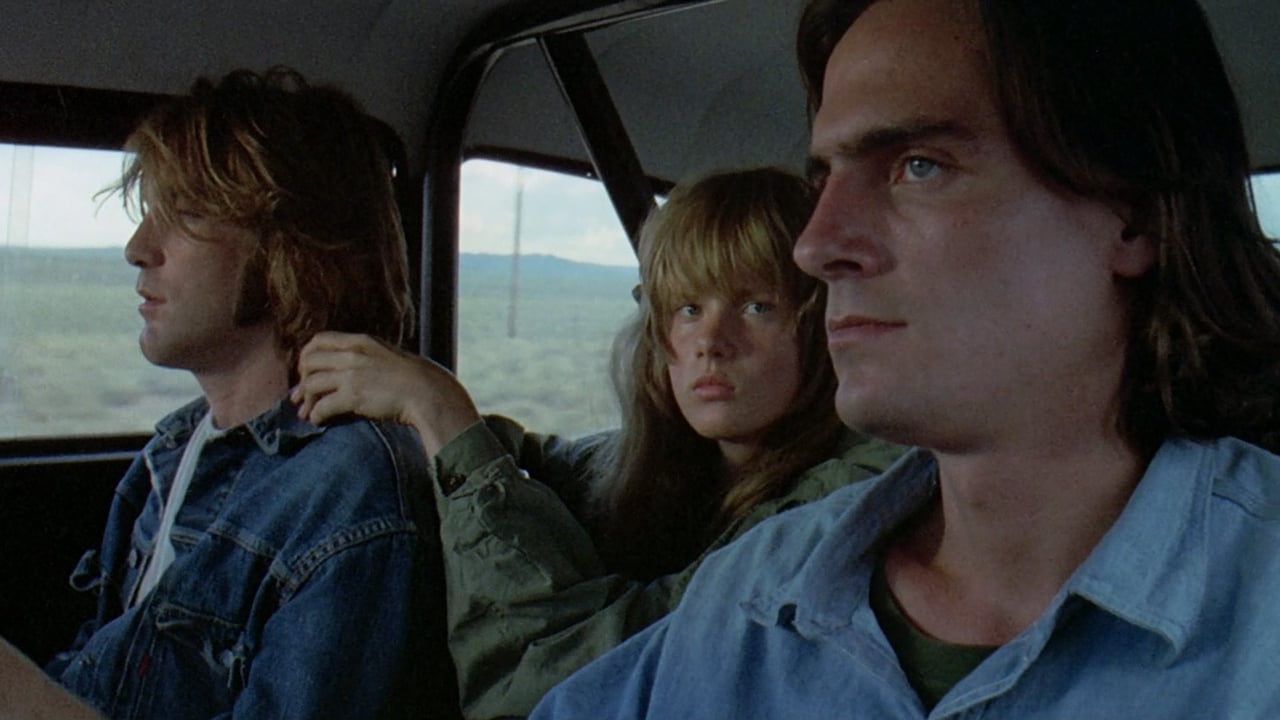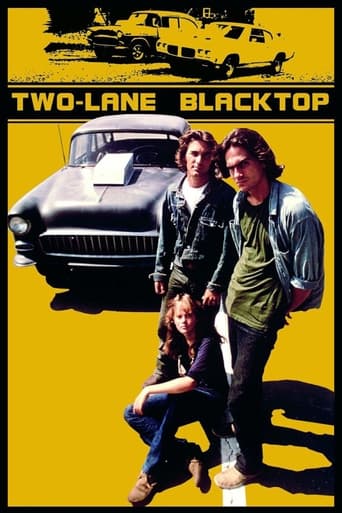

The tone of this movie is interesting -- the stakes are both dramatic and high, but it's balanced with a lot of fun, tongue and cheek dialogue.
... View MoreWhile it doesn't offer any answers, it both thrills and makes you think.
... View MoreThis is one of the best movies I’ve seen in a very long time. You have to go and see this on the big screen.
... View MoreGreat movie. Not sure what people expected but I found it highly entertaining.
... View MoreI was going down a list of must see hot rod movies and never saw this one before. I was surprised I never saw this after seeing the cast of characters. It was a little dark and after a while I realized this is not really a hot rod movie but an actual film and that's probably why it's not on most of the motorhead lists. This film reminds me of people I knew and that could have swayed my opinion but none the less it was a great film and I'll see it again. If you like classic cars you will see lots of nice muscle cars and a scene from LA with the brotherhood street racing club.
... View MoreTwo-Lane Blacktop is "all about image and performance". Guys like the driver and the mechanic are the only ones who understand what's under the hood. Hearing them rattle off various car parts is no less cryptic, or magic, than anything else they do or say.Between the motherfuckin' automobile races, the two friends barely speak. They are fixated on the road and nothing else. They'd rather listen to it than the radio. Even after a win, they remain stoic, unaffected, mechanically recounting the results and the car's performance. Conversely, g.t.o. can't shut up. He's desperately searching for anybody along the road he can lie to or a tape he can pop in. He doesn't want a conversation either, not a real one anyway.The little dialogue there is happens between core characters inside of their cars. The minor characters barely exist, merely garnish for the racetracks. One of the few introspective thoughts, g.t.o. drunkenly opening up, is cut short by the driver. "It's not my problem", he says coldly. Despite their differences, they're tied together. Their fixation on their rides, genuine or superficial, can't fulfill them. "If I'm not grounded pretty soon, I'm gonna go into orbit." "The girl" is the only character not identified by something car related. Neither of the men say a word when she hops in their Chevy uninvited. She breaks the silence for them. Her character's role as an object of desire might feel like "sexism or somethin'", but it's not. She's the satisfaction she sings about. The rich, middle aged liar with the expensive car can't buy her. The good looking quiet types with the homegrown street-sweeper can't win her or win her over. She's temporary: here one minute and gone the next. "She's gonna burn you, man" Riding off on a motorcycle, the hippie girl ends up where she belongs: with an Easy Rider headed back to the '60s.
... View MoreA story of two men drag-racing across the United States in a primer grey '55 Chevy. Dennis Wilson is the mechanic, James Taylor is the driver.What makes this film notable, first of all, is the cast. As pointed out, the men with the car are two well-known musicians, not actors. In fact, they never acted before or since. This may make the film feel a bit more real. (It also helps us picture what it would be like for Taylor and Wilson to hang out.) This is an open road movie, a car movie. Some say it is boring and some say it is not a great car movie, as the cars do not get nearly the focus you might expect for a drag-racing picture. I see that, but I also see a vast world here that could exist in 1971 but certainly could not exist today (2016). Whatever may be lost is made up for.
... View MoreI've engaged in several debates over my two-and-a-half star review for Easy Rider, a classic, late-sixties staple of youth culture that focused on two men cruising the streets of the United States on motorcycles and seeing what needed to be seen. It was a decent film, with grand cinematography and an unsurprisingly invigorating soundtrack, but my point of criticism was it spoke to a generation that no longer had ears to hear it. It seemed crafted and meticulously molded to cater to the hippie-culture, who would go on to appreciate it the most, and anyone outside of that circle may have had a hard time truly connecting with the picture. While I can appreciate the film for its history, aesthetics, and stylistic attributes (especially the memorable performances of Peter Fonda and Dennis Hopper), I simply couldn't embrace and enjoy it as the experience many have regarded it over the past three decades.So why the significantly higher rating for Monte Hellman's Two-Lane Blacktop, a film with much of the same aesthetics, similar themes, and a premise not too distant from Easy Rider's? I feel I found this one more entertaining and watchable because it was more of a relationship study rather than a piece dedicated to service a particular culture's standards and norms. Two-Lane Blacktop has themes that can be concatenated with Easy Rider's, but it has a more efficient way of communicating them and spending more time developing a relationship rather than catering to a specific group of people.The film is simplicity itself; two wayward young men drive on Route 66 in their modified and meticulously-perfected 1955 Chevy 150, searching for impromptu drag races. They pick up a young woman, who becomes both of their love interests, and challenge another drifter in a 1970 Pontiac GTO to a lengthy race with the prize being the pink slips to their car. The two young men are played by singer-songwriter James Taylor and Beach Boy Dennis Wilson, making this their first and only film roles, the girl is Laurie Bird, and the GTO-driver is Warren Oates.When a film gives you this little, there must be something below the surface, and dissection and examination of Two-Lane Blacktop's minimalist style proves that it has thematic resonance. The encompassing theme, above all, is a depiction of youth alienation in the late sixties and early seventies. Right around this time, films such as The Graduation and Easy Rider were being made, waking up an ignorant public that felt that teenagers lacked personality and character and were blank humans until adulthood. Two-Lane Blacktop startled people - or those who chose to see it since it was universally ignored until several years after its release - to see such a blunt yet subtle portrait of alienation in youths.Taylor and Wilson are faceless, to say the least, yet their facial expressions, blank stares, and brief dialogs are ironically telling. There isn't much to these characters other than their love for their car and their constant, almost compulsive nannying of it at every service station to make sure it runs right and is tuned to perfection. Even the girl who tags along with the boys and the GTO-driver who challenges them have no identifiable personalities. This is obviously a tactic employed by screenwriter Rudolph Wurlitzer in order to examine just how vacant and empty these characters are, but even recognizing this moral, the film becomes a bit tedious (especially in the third act when it becomes evident that the film doesn't even want to develop these characters even if it runs into the perfect opportunities).As a lover of dialog and explicit discussion in films, it's always difficult for me to watch and sink into a film that has minimal dialog. Consistent readers know I hunger for character investment, and always try to identify with characters I can sympathize with, relate to, and recognize as real people. To enter Two-Lane Blacktop with this goal and mindset and come out successful is simply impossible. Wurlitzer and director Monte Hellman do not want you to relate with these characters in any way at all. You should be simply observant of their travels and life and leave it at that.Shot with an impeccable eye for locational beauty (thanks to Hellman's steady direction and Jack Deerson's cinematography), and complete with wide-shots of Route 66 and a terrific musical score, Two-Lane Blacktop is a feast for the eyes and a thought-provoking exercise in troubled and possibly wasted youth. Because it only takes place on Route 66, it could very well be categorized as a one-setting film. If that's the case, it's one of the most minimalist and truly intriguing one-setting pictures ever made.Starring: James Taylor, Dennis Wilson, Warren Oates, and Laurie Bird. Directed by: Monte Hellman.
... View More